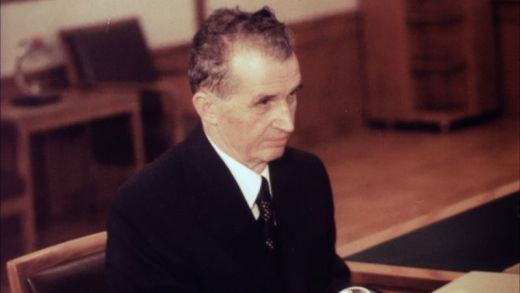[This is the second in a series of dispatches relating to the 2010 New York Film Festival.]
“The film we just saw,” muttered a nameless tastemaker just after the screening. “Who is it for? Romanians? Political junkies?”
“Humorless film geeks? Cultural masochists? Those who view watching paint dry as too adventurous?” I was tempted to rejoin. Some random canvassing revealed I wasn’t alone in my assessment. Even so, who was I to judge this film when my own grasp of Eastern European history was so tenuous? My knowledge of Ceauşescu was as dependable as a quadriplegic being asked to prepare a Caesar salad. (Indeed, one could stab both shaky offerings with a plastic fork. I apolgize to Romania.) But it seems to me that a movie collecting the life of a possibly clueless, possibly calculating leader prone to genocide, basking in his private personality cult, and a view of his subjects out of step from the reality of their privations (I believe Ceauşescu’s eventual assassination by Romanian revolutionaries should have been the telltale sign that something was awry on this last point) shouldn’t be so lackluster. I certainly hadn’t felt blasé about Shoah or any of the countless political documentaries with protracted running times that I had wolfed down in my twenties.
I suppose that the dry intellectuals — the so-called film dweeb crowd that certain online lunatics complain about, but who aren’t nearly as bad as paranoia elsewhere would suggest — are likely to appreciate this formalistic exercise. At three hours, this film is so oppressively long, with few pleasures laced within its Bucharest Death March, that the viewer feels very much without options, much like a citizen of Communist Romania. If this is the emotion that director Andre Ujica intended to convey, I can safely report that he has succeeded. It was only my commitment to judging the entire film that prevented me from stomping out of this snoozefest and carrying out my own private revolution with a bottle of scotch.
Let me dwell first on a few aspects I enjoyed: (1) a volleyball game, taken from what appears to be home movies, in which Ceauşescu is physically awkward and hilariously girly, recalling George Herbert Walker Bush’s wimpy image (Remember that pathetic baseball throw? Infinitely worse than Obama and the man was captain of his Yale baseball team!), (2) a ridiculous parade for some Communist triumph featuring surreal floats depicting sporting matches pushing slowly down the streets (two boxers going at it as the individuals holding the ring move forward, a volleyball game in which one team constantly paces backwards, et al.), (3) up to a certain tedious point, the repeat imagery of world leaders jetting away from airport runways, thus demonstrating how ephemeral their alliances with Ceauşescu are, (4) the occasional jarring cuts to Romanians dancing to pop music (I wish there had been more of this, but this film prefers to drag), and (5) Ceauşescu’s failed attempts at aristocratic flourishes (his awkward efforts with a sled, his unpersuasive claim that he is an intellectual, et al.).
In other words, the film is, at times, an amusing counterfactual. Apparently, it truly takes Communist oppression to get filmmakers to take the piss out of their leaders, particularly when Ceauşescu – with his unbrushable childish curls protruding atop his head, his puffed up cheeks, the suit that doesn’t quite fit his chubby form, and that lower lip resembling, at times, a half-inflated condom accident – strongly resembles an assclown. (I wish some enterprising underground filmmaker would make a similar film about Bush the 43rd or Tony Blair. If the Autobiography succeeds at one thing, it demonstrates the elastic nature of contextualized found footage.) Even so, three hours of world leaders shaking hands, Ceauşescu engaging in photo ops, and Ceauşescu supervising projects that we know will fail (inter alia) does get more than a bit tedious. And the moments I’ve mentioned can only be mined after some tedious ten minute setpiece. Andre Ujica does demonstrate a certain flair for visual association (the clean and orderly buildings of Communist China compared against Communist Romania’s industrial chaos, leading one to ponder whether it’s the man, the system, or the people which causes this kind of disparity), but his film is centered more around Ceauşescu as Buffoon. Does a buffoon kill 70,000 people? I suppose that moral question depends upon how swift you are with reductionist assertions and your worldview. But this Autobiography, while not explicitly referencing Ceauşescu’s early days as a peasant, chooses to gloss over the suffering and the death. Yes, I get that Ceauşescu very much did the same thing and that the film is meant to be a vicarious expression of this. But this seems an incomplete and needlessly limiting portrait of a man who, despite his frippery, was as calculating as he was flip.
